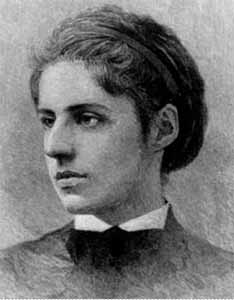It is a little known fact that when first asked to write a poem for the Statue of Liberty, Emma Lazarus declined.
When first approached by her friend Constance Cary Harrison about writing a poem for the Bartholdi Statue Pedestal Fund (otherwise known as the fund which raised money for the base of the Statue of Liberty), Harrison reports that Emma responded with a stern “no,” followed by a line I often wish I could claim as my own: “I don’t write on command.” Harrison implored Emma to think of the Eastern European immigrants of whom she was so fond, and that was all it took to open the floodgates of Emma’s mind. Within two days, “The New Colossus” was complete.

At the beginning of my time working as a summer educator for the AJHS Emma Lazarus Program with the Fresh Air Fund and Education Alliance, I knew well the feeling that Emma experienced upon being asked to write a poem to honor the Statue. The difference between me and Emma, is that I didn’t feel it for myself, but on behalf of the students I had the joy of working with every day for the last two months. Each day, the inimitable Rebeca Miller (in full historic interpreter garb as Emma Lazarus) and I worked with kids ages 7-13, and taught them how to write poems of their own.
At the end of the program, we asked each student to write and submit their poems. As they wrote, I imagined Emma’s voicing echoing through our students’ thoughts: “I don’t write on command.” Yet, sessions which began with students saying that they don’t like poetry quickly transformed into sessions full of kids who, understanding that they could write poetry about whatever is important to them, were eagerly picking up their pens, and putting their fingers to the keyboard.

I learned some lifelong lessons over the last two months. Truth be told, spending this time with Emma Lazarus has allowed me to give myself permission to think outside the box, to use my own feelings to motivate my writing, and to view my own experiences as worthy of sharing. I see in the students’ demeanors that they feel the same way. Teaching this class has shown me the power of giving students a voice by telling them that what they see, feel, hear, and experience in the world matters. Not only does it matter, it is completely unique to them. Students who had never written poetry before were jubilant to learn how to use their poetic voices.
Two months into this project, I have finally transformed from feeling like Emma being asked to write “on command,” into Constance Cary Harrison as she received Emma’s completed masterpiece.
